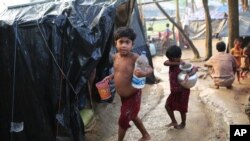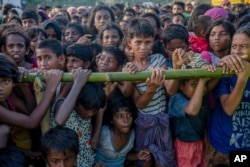Aid agencies are scaling up efforts to contain an outbreak of diarrheal diseases that could have serious health consequences for many of the more than one-half million Rohingya refugees from Myanmar who are living in squalid, overcrowded conditions in Cox’s Bazar, Bangladesh.
The U.N. refugee agency, Bangladeshi public health authorities and other parties are collaborating on several fronts to prevent the outbreak of diarrheal diseases from getting out of control.
They report a 20-bed treatment center has opened in Kutupalong Refugee Camp, which is hosting thousands of Rohingyas who recently fled violence in neighboring Myanmar. The agencies say they plan to open diarrheal treatment centers in three other locations by the end of the week. These will be able to accommodate 80 patients. More treatment and medical consultations centers also are in the offing.
U.N. refugee spokesman Andrej Mahecic says there are no firm statistics yet on cases of acute watery diarrhea among the newly arrived refugees.
“We are taking action to try to prevent severe illness and deaths," said Mahecic. "We have seen an increasing trend of diarrheal disease cases, including cases of diarrhea with severe dehydration. So far, refugees with these conditions have been treated at clinics run by UNHCR and other agencies, and at local public health facilities.”
Cholera is endemic in Bangladesh and fears of a potential outbreak of the fatal disease are growing. Mahecic notes cholera can spread easily among the hundreds of thousands of Rohingya who are living in overcrowded, unsanitary conditions.
A World Health Organization official tells VOA some 900,000 doses of oral cholera vaccine are expected to arrive in Bangladesh in the coming days. He says a mass vaccination campaign is expected to get under way one or two weeks after.








